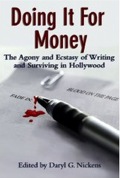Barring some sort of Actual News Event, I’ll be one of the guests on Airtalk this Tuesday, July 11th at 11:30 a.m. (At least, that’s the time for Los Angeles listeners.)
Host Judy Muller will be talking with [Chris Brancato](http://imdb.com/name/nm0104333/) and me about the book *Doing It for Money: The Agony and Ecstasy of Writing and Surviving in Hollywood*, in which I have an essay. (And which I recently [blogged about](http://johnaugust.com/archives/2006/are-you-somebody).) The book’s editor, Daryl G. Nickens, will also be on hand.
So, tune in and witness how inarticulate I am when I don’t have a keyboard in front of me.
 The Writers Guild Foundation has a new book out,
The Writers Guild Foundation has a new book out,